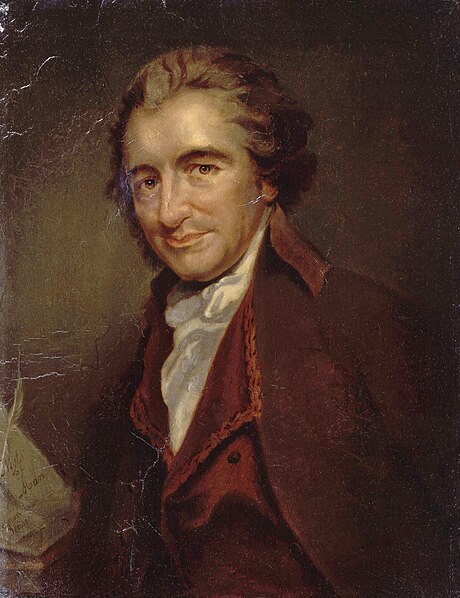
BB NOTE: In conversation with my brother (we'll call him Captain Five) tonight we started talking about good old Thomas Paine, one man with common sense. He was the original Blogfather.
Excerpts from Wikipedia with notations by BabyBlue:
A radical pamphleteer (BB NOTE: That's 18th Century English for "Blogger"), Thomas Paine anticipated and helped foment the American Revolution through his powerful writings, most notably Common Sense, an incendiary pamphlet (NOTE: that is, "blog") advocating independence from the Kingdom of Great Britain (NOTE: Sound familiar?). Common Sense, Paine's pro-independence monograph published anonymously (NOTE: ANONYMOUSLY no less!) on January 10, 1776, spread quickly among literate (NOTE: As opposed to those who do not know how to use their computers) colonists. About 120,000 copies are alleged to have been distributed throughout the colonies (NOTE: pre-Internet - you can be sure royalists weren't happy about it, though, any more than they are now) which themselves totaled only a few million free inhabitants. This work convinced many colonists, including George Washington, to seek redress in political independence from the Kingdom of Great Britain.
Paine's strength lay in his ability to present complex ideas in clear and concise form (NOTE: meaning, that is, blogging - no time for fancy and frills), as opposed to the more philosophical approaches of his Enlightenment contemporaries in Europe (NOTE: read - bor-ing), and it was Paine who proposed the name United States of America (NOTE; Like what use to be at the end of EC-USA before TEC - another anti-Paine infraction - hurled it aside) for the new nation. When the war arrived (NOTE: Kinda like a summit that stops pretending), Paine published a series of important pamphlets (NOTE: "blog postings"), The Crisis (NOTE: Sound familiar?), credited with inspiring the early colonists during the ordeals faced in their long struggle with the British. The first Crisis paper (NOTE: "blog posting"), published on December 23, 1776, began with the famous words:
These are the times that try men's souls. The summer soldier and the sunshine patriot will, in this crisis, shrink from the service of their country; but he that stands it now, deserves the love and thanks of man and woman. Tyranny, like hell, is not easily conquered; yet we have this consolation with us, that the harder the conflict, the more glorious the triumph.
BB NOTE: Tom Paine blogged, oops, I mean wrote something for everyone whatever "side" they might be on today. He is both a hero to today's progressives, conservatives, libertarians, and traditionalists alike (how many people can say that with a straight face?). He enraged just about everybody and died without any fanfare, a fate common to those who speak their conscience (even anonymously) whatever that may be. In fact, no one knows what happened to his bones - they got lost out in the blogosphere. I am sure there were times he might have wished he counted to a hundred before he published. His bones sure do.
However, one may want to pause before hurling accusations against a free press - be they industrial strength institutional verbiage or pamphlet blog postings or one might wake up one morning to find oneself accepting the Maximilien Robespierre Award, eh Bishop Lipscomb? Paine - whatever he did do - never did that.
Tom Paine, Patron Saint of Bloggers. Only he'd hate that and probably write some outrageous pamphlet denouncing all who would seek to hand him a distinguished title, any title, especially from anyone in organized religion - even Episcopalians ...
...even if the title is "The Blogfather."
Too bad Tom.
Get the shoe and try it on.
Once you find your foot that is.
bb

6 comments:
I find that interesting. I've never thought of blogging in such a...grandiose manner.
That's pretty insightful.
And Thomas Paine is awesome, as far as historical figures go.
Ack! He looks like Harry Shearer!
Actually, he gets a decidedly mixed reaction from most conservatives and traditionalists, mostly due to his response to Edmund Burke in which he defended the French Revolution (though never enough to satisfy the French), and his rather vigorous rejection of Christianity, in which he laid the groundwork for many of the arguments now commonly held by liberal Episcopal bishops. He also had a reputation for being willful and arrogant.
So, I don't know about calling him a hero.
But no one challenges his claim to profound eloquence, even if he were profoundly wrong about a number of things. Given his opinions about religion, he probably would not be on the side of traditionalist Anglicans were he alive today.
I'd call him a hero. If it wasn't for Common Sense, Adams would not have been provoked to write Thoughts On Gov.
Although Common Sense was progress in terms of who Jefferson was writing to (aimed at the man with the mug), it did not provide a solution. In turn, Adams wanted to build upon what Paine had tore down. Common Sense was also necessary in the revolution in that it was very persuasive to the common man. Ideas on the revolution would have remained cafe-conversations amongst colonists had Paine not taken the initiative to publish this outspoken pamphlet.
Thanks for posting, Anon!
bb
just giving credit where credit is due
Post a Comment